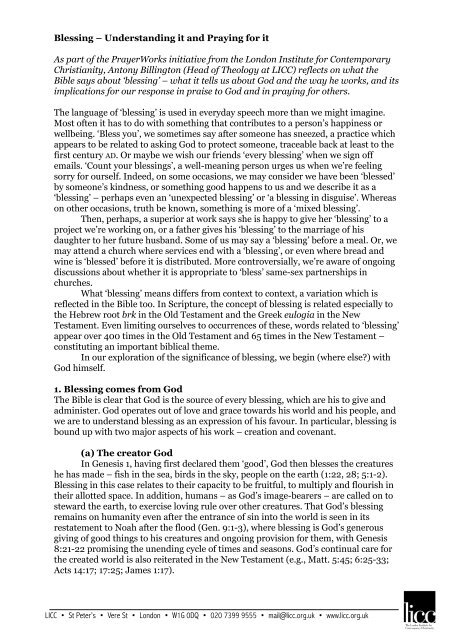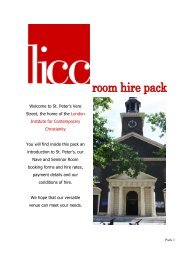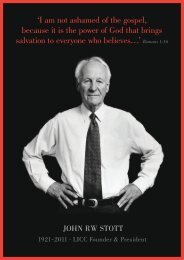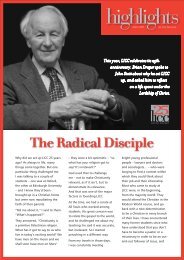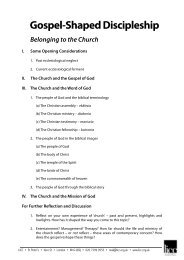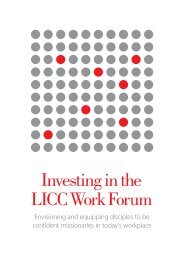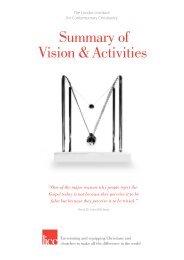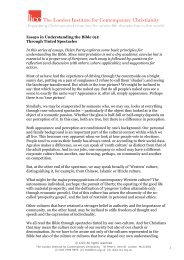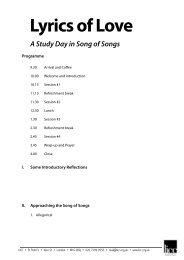Blessing â Understanding it and Praying for it - The London Institute ...
Blessing â Understanding it and Praying for it - The London Institute ...
Blessing â Understanding it and Praying for it - The London Institute ...
Create successful ePaper yourself
Turn your PDF publications into a flip-book with our unique Google optimized e-Paper software.
<strong>Blessing</strong> – <strong>Underst<strong>and</strong>ing</strong> <strong>it</strong> <strong>and</strong> <strong>Praying</strong> <strong>for</strong> <strong>it</strong><br />
As part of the PrayerWorks in<strong>it</strong>iative from the <strong>London</strong> Inst<strong>it</strong>ute <strong>for</strong> Contemporary<br />
Christian<strong>it</strong>y, Antony Billington (Head of <strong>The</strong>ology at LICC) reflects on what the<br />
Bible says about ‘blessing’ – what <strong>it</strong> tells us about God <strong>and</strong> the way he works, <strong>and</strong> <strong>it</strong>s<br />
implications <strong>for</strong> our response in praise to God <strong>and</strong> in praying <strong>for</strong> others.<br />
<strong>The</strong> language of ‘blessing’ is used in everyday speech more than we might imagine.<br />
Most often <strong>it</strong> has to do w<strong>it</strong>h something that contributes to a person’s happiness or<br />
wellbeing. ‘Bless you’, we sometimes say after someone has sneezed, a practice which<br />
appears to be related to asking God to protect someone, traceable back at least to the<br />
first century AD. Or maybe we wish our friends ‘every blessing’ when we sign off<br />
emails. ‘Count your blessings’, a well-meaning person urges us when we’re feeling<br />
sorry <strong>for</strong> ourself. Indeed, on some occasions, we may consider we have been ‘blessed’<br />
by someone’s kindness, or something good happens to us <strong>and</strong> we describe <strong>it</strong> as a<br />
‘blessing’ – perhaps even an ‘unexpected blessing’ or ‘a blessing in disguise’. Whereas<br />
on other occasions, truth be known, something is more of a ‘mixed blessing’.<br />
<strong>The</strong>n, perhaps, a superior at work says she is happy to give her ‘blessing’ to a<br />
project we’re working on, or a father gives his ‘blessing’ to the marriage of his<br />
daughter to her future husb<strong>and</strong>. Some of us may say a ‘blessing’ be<strong>for</strong>e a meal. Or, we<br />
may attend a church where services end w<strong>it</strong>h a ‘blessing’, or even where bread <strong>and</strong><br />
wine is ‘blessed’ be<strong>for</strong>e <strong>it</strong> is distributed. More controversially, we’re aware of ongoing<br />
discussions about whether <strong>it</strong> is appropriate to ‘bless’ same-sex partnerships in<br />
churches.<br />
What ‘blessing’ means differs from context to context, a variation which is<br />
reflected in the Bible too. In Scripture, the concept of blessing is related especially to<br />
the Hebrew root brk in the Old Testament <strong>and</strong> the Greek eulogia in the New<br />
Testament. Even lim<strong>it</strong>ing ourselves to occurrences of these, words related to ‘blessing’<br />
appear over 400 times in the Old Testament <strong>and</strong> 65 times in the New Testament –<br />
const<strong>it</strong>uting an important biblical theme.<br />
In our exploration of the significance of blessing, we begin (where else?) w<strong>it</strong>h<br />
God himself.<br />
1. <strong>Blessing</strong> comes from God<br />
<strong>The</strong> Bible is clear that God is the source of every blessing, which are his to give <strong>and</strong><br />
administer. God operates out of love <strong>and</strong> grace towards his world <strong>and</strong> his people, <strong>and</strong><br />
we are to underst<strong>and</strong> blessing as an expression of his favour. In particular, blessing is<br />
bound up w<strong>it</strong>h two major aspects of his work – creation <strong>and</strong> covenant.<br />
(a) <strong>The</strong> creator God<br />
In Genesis 1, having first declared them ‘good’, God then blesses the creatures<br />
he has made – fish in the sea, birds in the sky, people on the earth (1:22, 28; 5:1-2).<br />
<strong>Blessing</strong> in this case relates to their capac<strong>it</strong>y to be fru<strong>it</strong>ful, to multiply <strong>and</strong> flourish in<br />
their allotted space. In add<strong>it</strong>ion, humans – as God’s image-bearers – are called on to<br />
steward the earth, to exercise loving rule over other creatures. That God’s blessing<br />
remains on human<strong>it</strong>y even after the entrance of sin into the world is seen in <strong>it</strong>s<br />
restatement to Noah after the flood (Gen. 9:1-3), where blessing is God’s generous<br />
giving of good things to his creatures <strong>and</strong> ongoing provision <strong>for</strong> them, w<strong>it</strong>h Genesis<br />
8:21-22 promising the unending cycle of times <strong>and</strong> seasons. God’s continual care <strong>for</strong><br />
the created world is also re<strong>it</strong>erated in the New Testament (e.g., Matt. 5:45; 6:25-33;<br />
Acts 14:17; 17:25; James 1:17).<br />
LICC • St Peter’s • Vere St • <strong>London</strong> • W1G 0DQ • 020 7399 9555 • mail@licc.org.uk • www.licc.org.uk
So significant is this theme that one biblical scholar, Claus Westermann, made<br />
a distinction between blessing as God’s ongoing activ<strong>it</strong>y in sustaining creation<br />
through natural processes, <strong>and</strong> deliverance as God’s isolated acts of saving his people<br />
through remarkable events. Arguably, as we shall see, God’s acts in creation <strong>and</strong><br />
salvation shouldn’t be distinguished too sharply, but <strong>it</strong>’s still worth noting that God is<br />
present not just in his mighty acts of ‘saving’, but in the ongoing results of his activ<strong>it</strong>y<br />
of blessing human<strong>it</strong>y <strong>and</strong> his constant sustaining work in all realms of life. To be<br />
sure, the Bible tells of a series of events in which God works powerfully on behalf of<br />
his people, but he is as much a part of our ongoing existence in the giving of life, the<br />
bringing up of children, <strong>and</strong> the cycle of the working week. God’s blessing in these<br />
realms is continuous <strong>and</strong> often unnoticed, but no less real <strong>for</strong> that.<br />
Even so, the opening chapters of Genesis also show how sin results in rebellion<br />
against God, estrangement of men <strong>and</strong> women from each other, <strong>and</strong> the ensuing<br />
struggle to live <strong>and</strong> work in a fallen world. It becomes apparent that sin is allpervasive<br />
as well as destructive, <strong>and</strong> brings about death. What now of God’s intention<br />
to bless? All this provides the backdrop <strong>for</strong> what follows w<strong>it</strong>h the call <strong>and</strong> promise to<br />
Abraham, the beginning of the story of salvation, where God’s blessing on human<strong>it</strong>y<br />
becomes particularised in a chosen people.<br />
(b) <strong>The</strong> covenantal God<br />
To be blessed is not only to benef<strong>it</strong> from God’s ongoing gifts in creation but to<br />
enjoy special relationship w<strong>it</strong>h God. God’s desire <strong>and</strong> intention to bless his people is<br />
bound up w<strong>it</strong>h the covenant relationship he establishes w<strong>it</strong>h them, beginning w<strong>it</strong>h<br />
Abraham.<br />
<strong>The</strong> promise to Abraham<br />
<strong>The</strong> promises to Abraham in Genesis 12:1-3, given against the backdrop of the<br />
curses announced in the previous chapters (3:14, 17; 4:11; 5:29; 9:25), mark a new<br />
turning point in God’s dealings w<strong>it</strong>h the world. Judgment is not the last word: God<br />
does not reject the nations, but chooses one family to bring blessing to the nations.<br />
Thus begins the first episode in a long story in which God progressively works out his<br />
plan of restoration – a plan which includes creation <strong>it</strong>self. In this way, God’s promises<br />
to Abraham may be read in conjunction w<strong>it</strong>h Genesis 1 – as a reaffirmation of his<br />
original blessing on men <strong>and</strong> women. It is Abraham <strong>and</strong> his descendants who will<br />
become God’s instruments to bless the world. From this one man <strong>and</strong> his family,<br />
God’s blessing (‘bless’ words appear five times in Genesis 12:2-3) will flow to all<br />
nations.<br />
It’s not clear in 12:2 whether Abraham is comm<strong>and</strong>ed to be a blessing or told<br />
that he will be a blessing; e<strong>it</strong>her way involves the transmission of blessing to others.<br />
<strong>The</strong>re is also ongoing debate as to whether 12:3 should read ‘all families will be<br />
blessed through you’ (passive) or ‘all families shall bless themselves by<br />
you’ (reflexive). As <strong>it</strong> happens, similar phraseology elsewhere in Genesis (in 18:18;<br />
22:18; 26:4; 28:14) suggests both will be case, <strong>and</strong> the upshot is the same one way or<br />
the other – God’s blessing will be extended to the nations through Abraham.<br />
<strong>The</strong> link w<strong>it</strong>h worship<br />
<strong>The</strong> deliverance of God’s people from Egypt <strong>and</strong> the establishment of his<br />
covenant relationship w<strong>it</strong>h them at Sinai leads into the building of a sanctuary to<br />
facil<strong>it</strong>ate preservation of that relationship. Through the sacrificial cult, Israel was able<br />
to dwell in harmony w<strong>it</strong>h God <strong>and</strong> enjoy his ongoing blessing – mediated through the<br />
priests. So <strong>it</strong> is that at the conclusion of the first service of worship, Aaron blesses the<br />
people (Lev. 9:22-23), <strong>and</strong> the lev<strong>it</strong>es are set apart <strong>for</strong> this as an ongoing task (Deut.<br />
10:8; 21:5; 2 Chron. 30:27). God’s blessing is thus bound up w<strong>it</strong>h appropriate worship<br />
LICC • St Peter’s • Vere St • <strong>London</strong> • W1G 0DQ • 020 7399 9555 • mail@licc.org.uk • www.licc.org.uk
<strong>and</strong> sacrificial offering. W<strong>it</strong>h the priest’s blessing comes the guarantee that<br />
atonement has been successful, making the final blessing an essential component of<br />
the worship, confirming God’s favourable att<strong>it</strong>ude to his people, serving as a<br />
reminder that his presence is w<strong>it</strong>h them, to bless them.<br />
<strong>The</strong> priestly blessing is specified in Numbers 6:22-27:<br />
‘<strong>The</strong> LORD said to Moses, “Tell Aaron <strong>and</strong> his sons, ‘This is how you are to bless<br />
the Israel<strong>it</strong>es. Say to them:<br />
“<strong>The</strong> LORD bless you <strong>and</strong> keep you;<br />
the LORD make his face shine on you <strong>and</strong> be gracious to you;<br />
the LORD turn his face toward you <strong>and</strong> give you peace.”’<br />
“So they will put my name on the Israel<strong>it</strong>es, <strong>and</strong> I will bless them.”’<br />
<strong>The</strong> source of the blessing is clear: <strong>it</strong> is the Lord himself – seen in the threefold<br />
repet<strong>it</strong>ion of his name in the blessing <strong>it</strong>self, <strong>and</strong> confirmed in the final phrase (‘So<br />
they will put my name on the Israel<strong>it</strong>es, <strong>and</strong> I will bless them’). This strong link<br />
between God’s covenant name <strong>and</strong> the blessing of his people is also promised in<br />
Exodus 20:24, where <strong>it</strong> is connected w<strong>it</strong>h appropriate means of atonement. Although<br />
the blessing comes only through the Lord God, <strong>it</strong> is the priests – in a functional <strong>and</strong><br />
representative role – who mediate <strong>it</strong> to the people. It may be seen as a prayer <strong>for</strong><br />
God’s blessing <strong>and</strong> protection, his approval <strong>and</strong> grace, his attention <strong>and</strong> peace – a<br />
prayer which is promised to be effective – ‘I will bless them’ (6:27).<br />
<strong>The</strong> priestly blessing is alluded to in several psalms (e.g., 29:11; 115:12-15;<br />
134:3). Psalm 67, <strong>for</strong> example, begins: ‘May God be gracious to us <strong>and</strong> bless us <strong>and</strong><br />
make his face shine on us’ (67:1). But the blessing, in this case, is sought not <strong>for</strong> <strong>it</strong>s<br />
own sake or <strong>for</strong> the sake of Israel, but <strong>for</strong> all peoples, as seen in the next line of the<br />
Psalm – ‘so that your ways may be known on earth, your salvation among all<br />
nations’ (67:2) – w<strong>it</strong>h the Psalm expressing the hope that God’s blessing will become<br />
a global real<strong>it</strong>y. While Psalm 67 reflects on the ‘blessing’ part of the priestly<br />
benediction, Psalm 121 echoes the ‘keeping’ part, w<strong>it</strong>h <strong>for</strong>ms of that word appearing<br />
six times in this Psalm of Ascent. <strong>The</strong> Lord watches over his people not just on their<br />
occasional journeys, or even on the physical ascent to the temple in Jerusalem, but<br />
‘now <strong>and</strong> <strong>for</strong>evermore’ (121:8).<br />
<strong>The</strong> blessing promised in Numbers 6 is rein<strong>for</strong>ced by the account of Balaam in<br />
Numbers 22-24. <strong>The</strong> king of Moab hired Balaam to curse the people of Israel<br />
(22:4-6); but each time Balaam opened his mouth, he blessed them instead of cursed<br />
them (Num. 23:8, 20; 24:9-10). Balaam, in sp<strong>it</strong>e of his skills <strong>and</strong> renown as a<br />
prophet, was powerless to bless or curse Israel w<strong>it</strong>hout the Lord’s direction (cf. Deut<br />
23:4-5; Josh. 24:9-10; Neh. 13:1-2). It’s a strong indication that no magic or r<strong>it</strong>uals<br />
will make a difference; the author<strong>it</strong>y to bless belongs to the Lord who cannot be<br />
coerced.<br />
<strong>The</strong> way of obedience<br />
According to Exodus 23:25-26 <strong>and</strong> Deuteronomy 7:11-15, God promises to<br />
bless his people if they are obedient to him <strong>and</strong> provide them w<strong>it</strong>h everything<br />
necessary <strong>for</strong> their well-being in the l<strong>and</strong>. <strong>The</strong> blessings are articulated more fully in<br />
Deuteronomy 28:1-14 (cf. Lev. 26:1-13), providing a picture of the blessed life as<br />
bound up w<strong>it</strong>h the provision of food <strong>and</strong> water, children <strong>and</strong> crops, farming <strong>and</strong><br />
fertil<strong>it</strong>y, defeat of enemies <strong>and</strong> long life in the l<strong>and</strong>. <strong>The</strong> establishment of the<br />
covenant flows out of God’s undeserved love <strong>for</strong> the people (Deut. 7:7-8), but the<br />
promise of blessing seems cond<strong>it</strong>ional on ongoing obedience to the covenant<br />
stipulations (7:11-15; 11:8-15; 28:2), while disobedience causes a breakdown of the<br />
LICC • St Peter’s • Vere St • <strong>London</strong> • W1G 0DQ • 020 7399 9555 • mail@licc.org.uk • www.licc.org.uk
covenant, w<strong>it</strong>h curses replacing blessings (27:26; 28:15-68). At the very least, this<br />
shows that the old covenant people of God were not simply passive recipients of<br />
blessing, but were called on to follow God’s st<strong>and</strong>ards in everyday life.<br />
Even so, this is not a mechanistic system of reward <strong>and</strong> punishment so much<br />
as an expression of the consequences of staying w<strong>it</strong>hin <strong>and</strong> straying from the<br />
covenant stipulations which ordered their relationship w<strong>it</strong>h God <strong>and</strong> each other.<br />
Keeping or breaking God’s requirements does not set in motion a series of blessings<br />
or punishments applied by fate, but from the h<strong>and</strong> of God w<strong>it</strong>h whom they were in<br />
covenant relationship. This is not an early version of ‘prosper<strong>it</strong>y’ theology: the way of<br />
obedience does not have to do w<strong>it</strong>h earning blessing from God so much as the means<br />
of living w<strong>it</strong>hin the sphere of his ongoing blessing.<br />
<strong>The</strong> invocation of blessing<br />
So far, we have focused on God’s blessing of the created world <strong>and</strong> his<br />
covenant people, but we also see in Scripture examples of people praying <strong>for</strong> God’s<br />
blessing on other people. We have already noted that priests were called to<br />
pronounce blessings in the Lord’s name, but others were also able to do so, effectively<br />
invoking God’s blessing on someone else – ‘May God Almighty bless you <strong>and</strong> make<br />
you fru<strong>it</strong>ful’ (Gen. 28:3).<br />
In some cases, a blessing could be as simple as a greeting (Gen. 47:7; 1 Sam.<br />
13:10; 15:13; 2 Kings 4:29) or a parting (Gen. 31:55; 47:10; 2 Kings 19:39), or <strong>it</strong> could<br />
be as significant as a father invoking God <strong>for</strong> the continuation of blessing from one<br />
generation to another (Gen. 27:27-29; 48:15-16; 49:25-26). <strong>The</strong>re are examples of<br />
leaders blessing their people (Deut. 33:1; 2 Sam. 6:18; 1 Kings 8:14, 55), of family<br />
members blessing a woman about to be married (Gen. 24:60), of a mother blessing<br />
her son (Judges 17:2), of a blessing <strong>for</strong> fertil<strong>it</strong>y (1 Sam. 2:20-21). In each case,<br />
blessing appears to involve praying <strong>for</strong>, even invoking, wellbeing, health, <strong>and</strong><br />
prosper<strong>it</strong>y from one party to another. Such blessings are different from regular<br />
prayers in that they are addressed to fellow men <strong>and</strong> women rather than God, but<br />
they still function as requests or desires <strong>for</strong> God to bless, <strong>and</strong> he is still understood to<br />
be the ultimate source of the blessing.<br />
It should come as no surprise that many of the blessings occur in the context of<br />
family life, expressing hopes <strong>for</strong> the safe birth of children, fertil<strong>it</strong>y of crops, increase<br />
of herds, defeat of enemies, <strong>and</strong> length of days. Even so, w<strong>it</strong>hin the context of the<br />
biblical story as a whole, such blessings were significant <strong>for</strong> the ongoing survival of<br />
God’s covenant people precisely so that God’s plan to bless the nations could be<br />
brought to <strong>it</strong>s completion.<br />
A number of these themes are combined nicely in the book of Ruth, which<br />
shows the significance of blessing at the heart of the ongoing life of the covenant<br />
commun<strong>it</strong>y. <strong>The</strong> story begins w<strong>it</strong>h a parting, w<strong>it</strong>h Naomi urging her widowed<br />
daughters-in-law to return to their homes in Moab <strong>and</strong> effectively praying a blessing<br />
on them (1:8-9). In doing so, she comm<strong>it</strong>s their future to God, seeking his kindness<br />
<strong>for</strong> them, <strong>and</strong> praying that God will grant them the secur<strong>it</strong>y that comes from being<br />
married rather than the vulnerabil<strong>it</strong>y that would come w<strong>it</strong>h widowhood. <strong>The</strong> next<br />
blessing occurs in 2:4, as Boaz greets his harvesters w<strong>it</strong>h ‘<strong>The</strong> LORD be w<strong>it</strong>h you’, <strong>and</strong><br />
they reply w<strong>it</strong>h ‘<strong>The</strong> LORD bless you!’ Although this may be no more than a greeting<br />
(but what a greeting!), <strong>it</strong>’s a lovely reminder of God’s presence in the everyday, w<strong>it</strong>h<br />
the use of God’s name to invoke his blessing in daily life <strong>and</strong> work, in the meeting <strong>and</strong><br />
leaving of friends. In his first encounter w<strong>it</strong>h Ruth, Boaz prays a blessing <strong>for</strong> Ruth’s<br />
wellbeing because of her fa<strong>it</strong>hfulness to Naomi (2:11-12), words which are picked up<br />
again in his blessing of her in 3:10 as she dares to seek Boaz, as her next of kin, to<br />
take responsibil<strong>it</strong>y <strong>for</strong> her wellbeing. 2:19-20 then records Naomi’s reaction to Ruth<br />
LICC • St Peter’s • Vere St • <strong>London</strong> • W1G 0DQ • 020 7399 9555 • mail@licc.org.uk • www.licc.org.uk
when she returns from the fields w<strong>it</strong>h a supply of grain – ‘Blessed be the man’ – w<strong>it</strong>h<br />
a prayer seeking God’s blessing on Boaz. <strong>The</strong>n, after Boaz <strong>and</strong> Ruth are married,<br />
those who w<strong>it</strong>ness the occasion seek God <strong>for</strong> the provision of children <strong>and</strong> the<br />
building up of their household (4:11-12). When a child is born, the women bless God<br />
in thanksgiving <strong>for</strong> dealing kindly w<strong>it</strong>h Naomi (4:14-15). Naomi’s desire <strong>for</strong> Ruth to<br />
find secur<strong>it</strong>y in a husb<strong>and</strong>’s house (1:9) has come true. In a story shot through w<strong>it</strong>h<br />
covenant fa<strong>it</strong>hfulness, the blessing she sought has come about in the blessing from<br />
God of a family from whom will come king David (4:18-22), from whom will come<br />
Christ himself (Matt. 1:5). Here is one snapshot of the Old Testament story which<br />
traces the transmission of God’s promise of blessing from Abraham through the<br />
generations to all nations.<br />
That we are blessed by God means we acknowledge that God is Lord of<br />
creation <strong>and</strong> covenant, the one who freely gives us all good things. That we bless<br />
others is an expression that they too might enjoy what we have received. In<br />
relationship w<strong>it</strong>h God, we are blessed by him, a blessing which overflows from us to<br />
others which is then offered back to God in thanksgiving <strong>and</strong> praise.<br />
2. <strong>Blessing</strong> flows through Christ<br />
<strong>The</strong> New Testament links God’s blessing w<strong>it</strong>h Jesus, quintessentially expressed in<br />
Ephesians 1:3:<br />
‘Praise be to the God <strong>and</strong> Father of our Lord Jesus Christ, who has blessed us<br />
in the heavenly realms w<strong>it</strong>h every spir<strong>it</strong>ual blessing in Christ.’<br />
‘Spir<strong>it</strong>ual’ here may mean ‘of the Spir<strong>it</strong>’ – the blessing that comes by the Spir<strong>it</strong> – in<br />
which case, this blessing is triune-shaped: the Father blesses us through the Spir<strong>it</strong> in<br />
Christ, the three-in-one God working to bring about our salvation. Paul goes on to<br />
catalogue God’s amazing blessings – which come to us only because of the death of<br />
Christ, which brings about redemption, the <strong>for</strong>giveness of sins (Eph. 1:7).<br />
Already, then, <strong>it</strong> should be clear that while God continues to provide <strong>for</strong> the<br />
material wellbeing of his people, the New Testament has nothing like the same<br />
emphasis as the Old Testament on blessings in terms of material prosper<strong>it</strong>y. W<strong>it</strong>h the<br />
coming of Christ <strong>and</strong> the inauguration of the new covenant, God’s provision of<br />
blessings in the <strong>for</strong>m of fertil<strong>it</strong>y, descendants, long life <strong>and</strong> good health, give way to<br />
‘every spir<strong>it</strong>ual blessing in Christ’ – blessings to be experienced now, <strong>and</strong> which will<br />
be experienced in full w<strong>it</strong>h the final kingdom, blessings which the old covenant could<br />
only <strong>for</strong>eshadow.<br />
<strong>Blessing</strong> is now to be understood as mediated through Jesus Christ. For the<br />
Christian, then, Jesus becomes the focal point of blessing from God – in the<br />
fulfilment of blessing <strong>and</strong> in the invoking of <strong>it</strong>.<br />
(a) <strong>Blessing</strong> fulfilled<br />
It’s not too far into the early church period be<strong>for</strong>e Peter preaches that God has<br />
blessed us by sending his servant Jesus in fulfilment of his promise to Abraham (Acts<br />
3:24-26). Paul elaborates on this in his letter to the Galatians, showing how God’s<br />
promise to Abraham to bless all nations is now fulfilled in Christ (Gal. 3:6-14; cf. Heb.<br />
6:13-20; 12:17). He has done this because, in his death, Christ has borne the<br />
consequence of the curse of the law. Paul refers to Deuteronomy 27:26 <strong>and</strong> 21:22-23<br />
in Galatians 3:10-13, reminding the Galatians of the penalty of breaking the law <strong>and</strong><br />
so falling outside the sphere of God’s blessing. Christ redeems us from the curse,<br />
extending to Gentiles the blessing promised to Abraham, enabling Jew <strong>and</strong> Gentile<br />
alike to enjoy relationship w<strong>it</strong>h God. Once again, to read the blessings <strong>and</strong> curses of<br />
LICC • St Peter’s • Vere St • <strong>London</strong> • W1G 0DQ • 020 7399 9555 • mail@licc.org.uk • www.licc.org.uk
Deuteronomy 28 as if they were timeless principles is to confuse the covenant God<br />
made w<strong>it</strong>h the nation of Israel in that particular time <strong>and</strong> place in salvation history<br />
w<strong>it</strong>h the uncond<strong>it</strong>ional promise to Abraham now carried <strong>for</strong>ward <strong>and</strong> fulfilled in<br />
Christ.<br />
(b) <strong>Blessing</strong> invoked<br />
Echoing the language of Exodus 19:3-6 (in calling Israel to be a priestly<br />
kingdom, a holy nation, <strong>for</strong> the sake of nations), Peter is likewise clear that God was<br />
finally fulfilling his promise to bring the Gentiles into the blessing too (1 Pet. 2:9-10).<br />
That blessing gives them the privileges – <strong>and</strong> responsibil<strong>it</strong>ies – that went w<strong>it</strong>h the<br />
covenant. Hence, Israel’s call – their ident<strong>it</strong>y <strong>and</strong> role w<strong>it</strong>h respect to the world – is<br />
now taken up by the church, by all followers of Christ. God’s mission to bless all<br />
nations continues to be worked out through us, his chosen people – wherever we may<br />
find ourselves ‘scattered’ (1 Pet. 1:1).<br />
We are able to bless others because we ourselves have been blessed.<br />
<strong>Blessing</strong> of Christ<br />
<strong>The</strong> language of blessing is found in the early chapters of Luke’s gospel (1:42,<br />
68-69; 2:28-32) woven in w<strong>it</strong>h promises of God’s redemptive presence in the coming<br />
of Christ. <strong>The</strong>n, at the end of the gospel, in words that are reminiscent of the priestly<br />
blessing in Lev<strong>it</strong>icus 9:22, Christ blesses his disciples:<br />
‘When he had led them out to the vicin<strong>it</strong>y of Bethany, he lifted up his h<strong>and</strong>s<br />
<strong>and</strong> blessed them. While he was blessing them, he left them <strong>and</strong> was taken up<br />
into heaven. <strong>The</strong>n they worshiped him <strong>and</strong> returned to Jerusalem w<strong>it</strong>h great<br />
joy. And they stayed continually at the temple, praising God.’ (Luke 24:50-53)<br />
Somewhat ironically, Luke starts w<strong>it</strong>h a priest, Zechariah, unable to complete his<br />
service in the temple (1:21-22) <strong>and</strong> ends w<strong>it</strong>h Jesus giving a priestly benediction. He<br />
has made the sacrifice which brings about the <strong>for</strong>giveness of sins to be preached to all<br />
nations (24:46); now, as he departs in order to send the Spir<strong>it</strong> to be w<strong>it</strong>h them <strong>and</strong><br />
equip the disciples, he blesses them <strong>for</strong> the mission that lies ahead.<br />
<strong>Blessing</strong> through Christ<br />
It’s possible that an echo of the priestly benediction might be heard at the start<br />
of Paul’s letters, in the regular greeting – w<strong>it</strong>h the ‘grace <strong>and</strong> peace to you’<br />
reminiscent of the final sentence of the priestly prayer, ‘And be gracious to you... <strong>and</strong><br />
give you peace’ (Num. 6:25-26). If this is the case, Paul’s frequently-added words<br />
‘from God our Father <strong>and</strong> the Lord Jesus Christ’ in his greetings rein<strong>for</strong>ce the source<br />
of the blessing. Grace <strong>and</strong> peace provide more than just a convenient greeting, but<br />
summarise the blessings of the gospel – which come through Christ.<br />
Even if this is too much of a stretch, the benedictions or doxologies at the end<br />
of some of the New Testament letters function as blessings (e.g., Rom. 16:25-27; 1<br />
Cor. 16:23; 2 Cor. 13:14; Gal. 6:16, 18; Eph. 6:23-24; Phil. 4:23; Col. 4:18; 1 <strong>The</strong>ss.<br />
5:28; 2 <strong>The</strong>ss. 3:18; 1 Tim. 6:21; 2 Tim. 4:22; T<strong>it</strong>us 3:15; Philm. 25; Heb. 13:20-21, 25;<br />
1 Pet. 5:14; Jude 24-25). 2 Corinthians 13:14 is perhaps the most well known of these:<br />
‘May the grace of the Lord Jesus Christ, <strong>and</strong> the love of God, <strong>and</strong> the<br />
fellowship of the Holy Spir<strong>it</strong> be w<strong>it</strong>h you all.’<br />
LICC • St Peter’s • Vere St • <strong>London</strong> • W1G 0DQ • 020 7399 9555 • mail@licc.org.uk • www.licc.org.uk
This is instructive in <strong>it</strong>self, reminding us, like Ephesians 1:3, that grace is available<br />
only through Jesus Christ, is grounded in the love of God, <strong>and</strong> is mediated to us by<br />
the Holy Spir<strong>it</strong>.<br />
Hence, blessing is to be understood not only in theological terms (<strong>it</strong>s source in<br />
the creator-covenant God), but in christological terms, coming to us as a result of<br />
Christ’s work. It is only in Christ that we underst<strong>and</strong> what <strong>it</strong> means to blessed by God,<br />
<strong>and</strong> <strong>it</strong> is only because of Christ that we can bring to others his blessing (Rom. 15:29)<br />
<strong>and</strong> are able to bless, rather than curse, even those who persecute us (Luke 6:27-28;<br />
Rom. 12:14; 1 Peter 3:9).<br />
3. <strong>Blessing</strong> enlivens our praying<br />
<strong>The</strong> topic of ‘blessing’ is not always included in treatments of prayer. This is arguably<br />
an oversight, as an appropriate underst<strong>and</strong>ing of blessing might in<strong>for</strong>m <strong>and</strong> enliven<br />
our prayer life – as individual Christians <strong>and</strong> as local churches – in different ways.<br />
(a) Words of pet<strong>it</strong>ion<br />
<strong>Blessing</strong> one another in prayer is a way of acknowledging that all good things,<br />
which build us up <strong>and</strong> make us fru<strong>it</strong>ful, come from God. In blessing, we are<br />
expressing trust in God’s character <strong>and</strong> his love, not presuming on <strong>it</strong>, but asking him<br />
to continue to demonstrate his power in our lives <strong>and</strong> the lives of others, whether in<br />
the ongoing ‘mundane’ events of life or <strong>for</strong> the more ‘extraordinary’ needs of healing,<br />
rescue, provision, <strong>and</strong> direction.<br />
This involves the recogn<strong>it</strong>ion that God, in his grace, allows us to be the<br />
instruments of his blessing on others. Invoking God’s blessing on someone else thus<br />
serves as a particular kind of pet<strong>it</strong>ion, w<strong>it</strong>h the implication that we are praying <strong>for</strong> the<br />
Lord to bless that person. In keeping w<strong>it</strong>h examples from Scripture, such prayers may<br />
be addressed to the person rather than God, but we are nonetheless asking <strong>for</strong> God’s<br />
blessing on them. It might be particularly appropriate to bless someone at special<br />
times, perhaps of pastoral need, or during sickness, or in the context of a<br />
commissioning – but not exclusively so. We will want to seek God’s blessing on others<br />
in line w<strong>it</strong>h God’s creative <strong>and</strong> life-giving purposes, in a way that exercises trust in his<br />
ongoing provision <strong>for</strong> us. This means we will be cautious about identifying his<br />
blessing solely w<strong>it</strong>h the ‘spectacular’ – the miraculous <strong>and</strong> special interventions –<br />
rather than w<strong>it</strong>h his constant presence w<strong>it</strong>hin which the whole of life is lived, the<br />
ordinary as much as the extraordinary, the routine as much as the remarkable.<br />
Moreover, since Jesus is now the focal point of God’s blessing, our prayers of<br />
blessing <strong>for</strong> others will take their cue from him – his comm<strong>and</strong>ments, his call, his<br />
love. And so we may pray <strong>for</strong> others the blessing that comes w<strong>it</strong>h participating in his<br />
death (1 Cor. 10:16; cf. Mark 10:38-39), <strong>for</strong> empowerment to bless those who<br />
persecute us (Luke 6:28; Rom. 12:14; 1 Pet. 3:9), <strong>for</strong> the joy <strong>and</strong> confidence that<br />
comes through knowing that every spir<strong>it</strong>ual blessing comes from him (Eph. 1:3).<br />
(b) Words of power<br />
We know from personal experience that words are powerful. Pos<strong>it</strong>ive,<br />
affirming words build up, while negative words tear down. <strong>The</strong> power of speech to<br />
shape someone’s self-perception – a child, a spouse, a friend, a colleague – <strong>for</strong> good<br />
or <strong>for</strong> ill, is enormous. A recogn<strong>it</strong>ion of the power of words can, however, lead to a<br />
mistaken view of blessing which suggests that to say something is to make <strong>it</strong> happen,<br />
the presuppos<strong>it</strong>ion being that the person who utters a blessing has the author<strong>it</strong>y to do<br />
so effectively. But we should be clear that blessing is not a magical <strong>for</strong>mula <strong>for</strong><br />
victorious living, still less a guarantee of material prosper<strong>it</strong>y; nor is <strong>it</strong> about twisting<br />
God’s arm into doing something.<br />
LICC • St Peter’s • Vere St • <strong>London</strong> • W1G 0DQ • 020 7399 9555 • mail@licc.org.uk • www.licc.org.uk
It has sometimes been supposed that Old Testament curses <strong>and</strong> blessings<br />
operated w<strong>it</strong>h a view of language where the speakers believed that their words had<br />
causal, or even magical power. <strong>The</strong> story of Isaac blessing Jacob rather than Esau, <strong>for</strong><br />
instance, suggests the blessing cannot be taken back once <strong>it</strong> has been spoken (Gen.<br />
27). Is a magical control of the future implied?<br />
We are helped here w<strong>it</strong>h the recogn<strong>it</strong>ion of what is sometimes called the<br />
‘per<strong>for</strong>mative’ nature of language, the acknowledgement that words per<strong>for</strong>m certain<br />
actions. <strong>The</strong> phrase, ‘I now pronounce you husb<strong>and</strong> <strong>and</strong> wife’, or ‘You’re fired’,<br />
spoken by an appropriate person in an appropriate context, are not merely making<br />
statements about things but doing things. ‘Bless’ is also an example of per<strong>for</strong>mative<br />
language where something is done in the saying. But just as the words ‘I do’ or ‘I give<br />
<strong>and</strong> bequeath’ or ‘You’re fired’ only carry <strong>for</strong>ce in particular contexts where particular<br />
social mores are in place in which the words are accepted as carrying <strong>for</strong>ce, so also<br />
blessing is only effective when spoken w<strong>it</strong>h appropriate conventions in place. Genesis<br />
27 is a striking example of this: Isaac disposes of his estate in the <strong>for</strong>m of a blessing<br />
which is considered legally binding <strong>and</strong> can’t be taken back. <strong>The</strong> ‘power’ is not<br />
inherent in the words themselves so much as in the social conventions of their use,<br />
<strong>and</strong> has nothing to do w<strong>it</strong>h magic or fate.<br />
<strong>The</strong> primacy of God in blessing means that <strong>it</strong> his power that counts, rather<br />
than any supposed power inherent in the words themselves. <strong>Praying</strong> words of<br />
blessing has no power apart from the activ<strong>it</strong>y of God himself to bless. For us, this is<br />
an encouragement that prayers <strong>for</strong> blessing don’t depend on the right use of a special<br />
<strong>for</strong>mula, but on the promise <strong>and</strong> guarantee of God’s own word. It also means we can<br />
be confident that we won’t go far wrong if we bless others in line w<strong>it</strong>h Scripture –<br />
w<strong>it</strong>h the grain of God’s ongoing care <strong>for</strong> creation, in alignment w<strong>it</strong>h his desire <strong>for</strong><br />
covenant relationship w<strong>it</strong>h his people, <strong>and</strong> in tune w<strong>it</strong>h his work of redemption<br />
through Christ.<br />
(c) Words of praise<br />
If God comes first – as the source of all blessing – we bless people <strong>and</strong> things<br />
in relation to him. <strong>Blessing</strong> food, <strong>for</strong> instance, is a shorth<strong>and</strong> way of praising God <strong>for</strong><br />
<strong>it</strong>. We are not thanking the food <strong>it</strong>self, or invoking God to make sure <strong>it</strong> tastes good,<br />
but acknowledging him as <strong>it</strong>s ultimate giver.<br />
In fact, many of the occurrences of ‘bless’ words in the Bible are used by men<br />
<strong>and</strong> women back to God himself. Having received God’s blessing, the commun<strong>it</strong>y of<br />
fa<strong>it</strong>h blesses God in return – not to grant him favour in the way he does <strong>for</strong> us, but to<br />
give thanks. Throughout the Psalms, in particular, the people are called to ‘bless’ the<br />
Lord because of how he has blessed them, <strong>and</strong> the primary way they bless him is<br />
through praise (e.g., Ps. 28:6; 31:21; 34:1; 41:13; 68:19; 72:18; 89:52; 100:4; 103:2;<br />
104:1; 106:48; 124:6; 135:21; 144:1; 145:1-2, 10). In add<strong>it</strong>ion, in 1 Chronicles 29:10-11<br />
<strong>and</strong> 20-22, David ascribes glory to God, declaring how great he is (29:11); when he<br />
calls on those gathered to bless the Lord, their response is to bow their heads,<br />
worship <strong>and</strong> offer sacrifices to God (29:20-22). In this case, blessing the Lord affirms<br />
him as Lord <strong>and</strong> pays him honour.<br />
As much as we might seek God’s blessing <strong>for</strong> ourselves <strong>and</strong> <strong>for</strong> others, to follow<br />
the pattern of Scripture also involves blessing God – as an expression of individual or<br />
corporate praise, giving thanks to God, praising him, acclaiming him as Lord.<br />
(d) Words of preparation<br />
In both the Old Testament <strong>and</strong> the New Testament, the blessing of the<br />
congregation of God’s people appears to be significant. Some church trad<strong>it</strong>ions echo<br />
this in giving considerable place to blessing in their gatherings – in greetings, be<strong>for</strong>e<br />
LICC • St Peter’s • Vere St • <strong>London</strong> • W1G 0DQ • 020 7399 9555 • mail@licc.org.uk • www.licc.org.uk
<strong>and</strong> after the sermon, during communion, <strong>and</strong> so on. Perhaps especially <strong>for</strong> those less<br />
used to blessing in a congregational context, there may be a place <strong>for</strong> acknowledging<br />
the significance of the benediction as a crucial component of the gathered worship –<br />
as that which sends people on their way in service to Christ. <strong>The</strong> final blessing serves<br />
as a bridge from the gathering to the life outside the four walls of the church building,<br />
not merely marking the end of the worship service, but connecting the gathered<br />
worship to the scattered lives of the worshipping people beyond the weekly gathering.<br />
<strong>The</strong> benediction – appropriately used – prays <strong>for</strong> God’s providential care <strong>and</strong><br />
powerful equipping of his people as we move from the gathering into everyday life,<br />
asking that God will bless us as we do so.<br />
‘Now may the God of peace, who through the blood of the eternal covenant brought<br />
back from the dead our Lord Jesus, that great Shepherd of the sheep, equip you w<strong>it</strong>h<br />
everything good <strong>for</strong> doing his will, <strong>and</strong> may he work in us what is pleasing to him,<br />
through Jesus Christ, to whom be glory <strong>for</strong> ever <strong>and</strong> ever. Amen.’ (Hebrews 13:20-21)<br />
For further reading<br />
Ke<strong>it</strong>h Grüneberg, <strong>Blessing</strong>: Biblical Meaning <strong>and</strong> Pastoral Practice, Grove Biblical<br />
Series 27 (Cambridge: Grove Books, 2003).<br />
A helpful booklet-length treatment.<br />
Patrick D. Miller, <strong>The</strong>y Cried to the Lord: <strong>The</strong> Form <strong>and</strong> <strong>The</strong>ology of Biblical Prayer<br />
(Minneapolis: Fortress, 1994).<br />
A full <strong>and</strong> rich exploration of different types of prayer, especially in the Old<br />
Testament, w<strong>it</strong>h a useful chapter on blessing <strong>and</strong> cursing.<br />
Christopher Wright M<strong>it</strong>chell, <strong>The</strong> Meaning of BRK “To Bless” in the Old Testament,<br />
SBL Dissertation Series 95 (Atlanta: Scholars, 1987).<br />
A scholarly work which divides the uses of the brk root into three categories: God<br />
blessing man, man blessing man, <strong>and</strong> the use of brk in the praise of God.<br />
R. Scott Osborne, <strong>The</strong> Book of <strong>Blessing</strong>s (Xulon Press, 2007).<br />
Available as a free download – .<br />
A book which focuses on speaking blessings based on Scripture,<br />
using the language of the Bible, gathering biblical references modified in order to<br />
create blessings, divided into discrete areas such as blessing <strong>for</strong> courage, <strong>for</strong> joy, <strong>for</strong><br />
fa<strong>it</strong>h <strong>and</strong> trust, etc.<br />
Claus Westermann, <strong>Blessing</strong> in the Bible <strong>and</strong> the Life of the Church, Overtures to<br />
Biblical <strong>The</strong>ology, trans. Ke<strong>it</strong>h Crim (Philadelphia: Fortress, 1978).<br />
Something of a classic in the area, describing blessing in different trad<strong>it</strong>ions w<strong>it</strong>hin<br />
Scripture.<br />
Antony Billington<br />
Head of <strong>The</strong>ology, LICC<br />
Draft 1 – December 2011<br />
LICC • St Peter’s • Vere St • <strong>London</strong> • W1G 0DQ • 020 7399 9555 • mail@licc.org.uk • www.licc.org.uk


